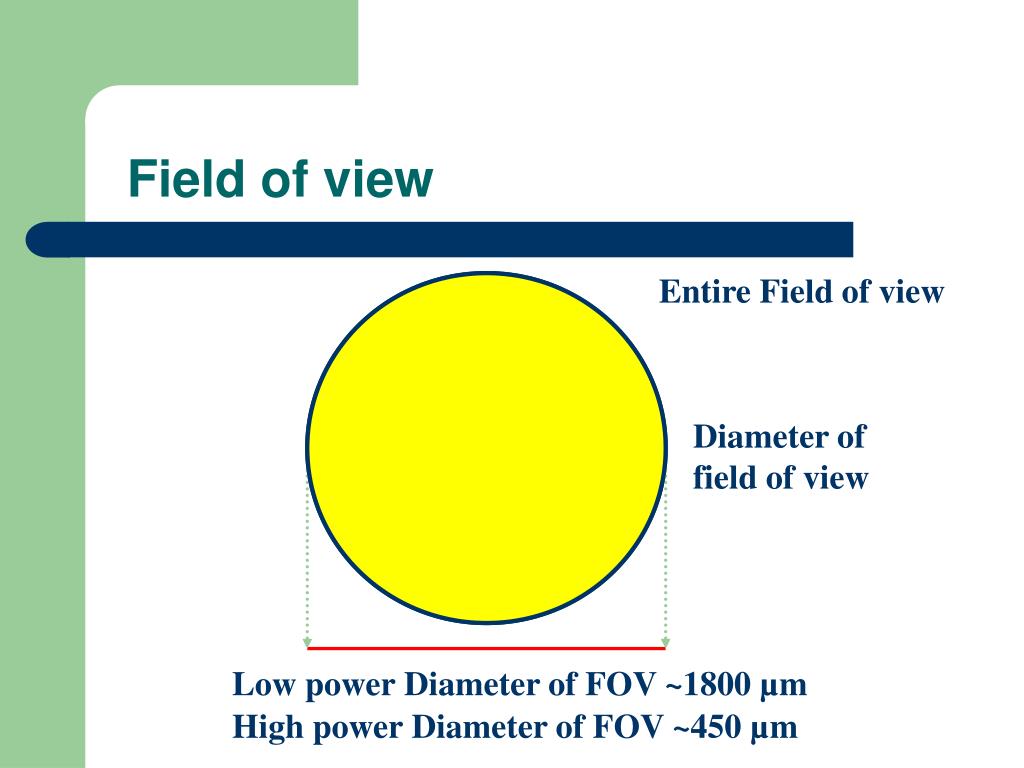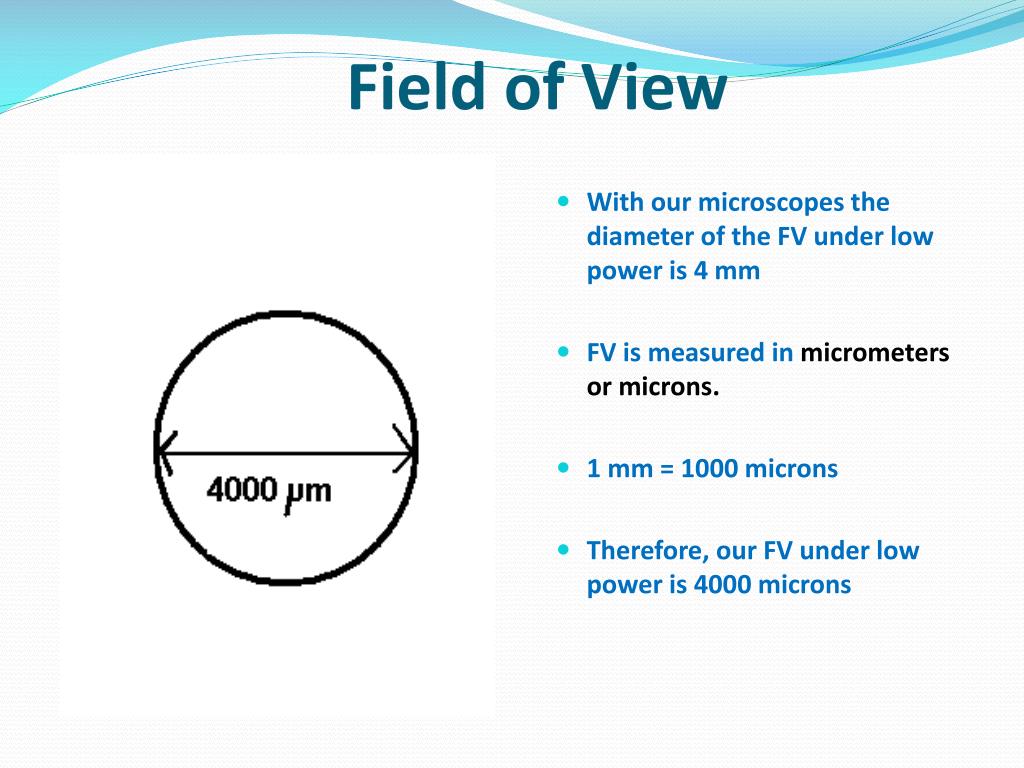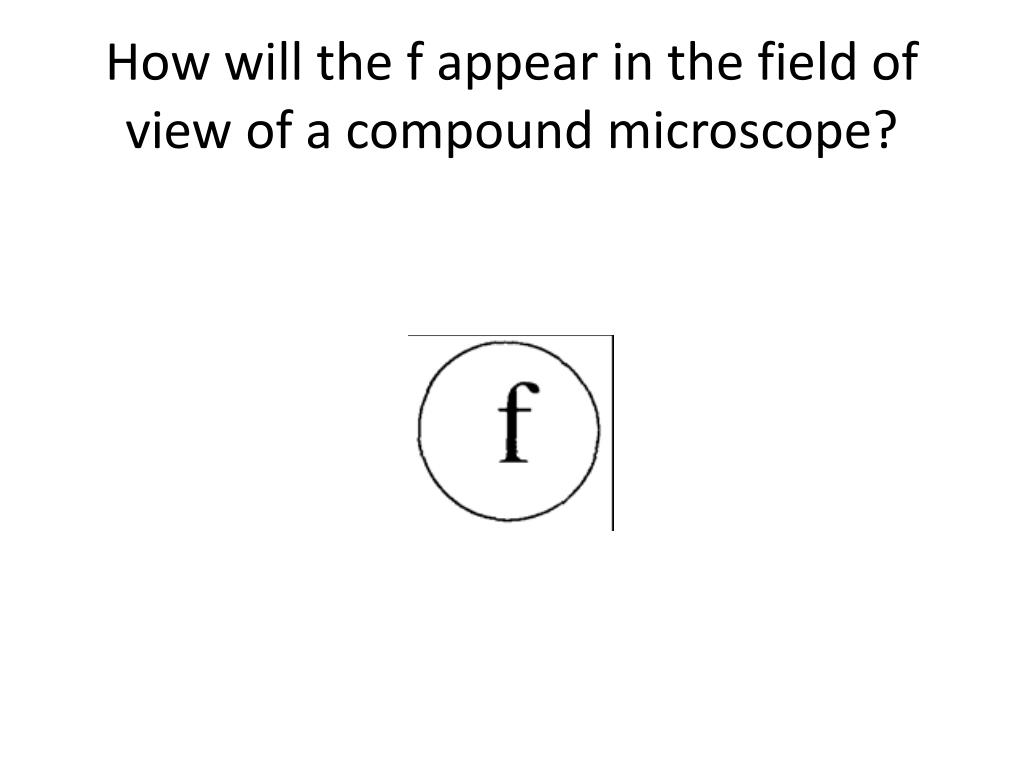Draw The F As Seen In The Low Power Field
Draw The F As Seen In The Low Power Field - Sharpen the focus, if necessary, with the coarse adjustment knob. Use the focusing sequence to view the slide under low power. Use the fine focus if necessary to bring the ruler into focus. Estimate the length (longest dimension) of the object in um: The slide to the left, what happens? Move the slide to the right, what happens? Because cells are usually too small to see with the naked eye, a microscope is an essential tool in the field of biology. Center the “e” in your field of view. Draw the letter “e” as it appears when you look at the slide under the microscope. Web you have been asked to prepare a slide with the letter f f f on it (as shown below). Estimate the length (longest dimension) of the object in urn: Place the slide on the stage and view in low power. Look at the microscope from the side: Total magnification = 1.6 mm field diameter = length of object = urn 9. Center the specimen in field, if necessary. Describe any changes in the appearance of the position of the fibers when you turn the adjustment knob back and forth. Estimate the number of millimeters that you see in the field of view: View the specimen in high power. Web draw what you see in the circle provided. Estimate the length (longest dimension) of the object in um: Use the focusing sequence to view the slide under low power. Draw the letter “e” as it appears when you look at the slide without the microscope. Total magnification = 1.6 mm field diameter = length of object = urn 9. You have been a ked to prepare slide with the letter fon it (as shown below). The slide to. Web you have been asked to prepare a slide with the letter f f f on it (as shown below). Estimate the length (longest dimension) of the object in pm total magnification = ioox field diameter — length of object = um 9. Use the focusing sequence to view the slide under low power. Estimate the number of millimeters that. Is, when using a 10x ocular and a 15x objective, the field size is 1.5mm, the approximate field size with a 30x objective is ____ mm. Observe the prepared “e” slide: Explain why these apparent changes occur. Move the slide to the right, what happens? When beginning to focus, the lowest power lens should be used. Web you have been asked to prepare a slide with the letter f f f on it (as shown below). If, after focusing in low power, only the fine adjustment need be used to focus the specimen at the higher powers, the microscope is said to be _______. Describe any changes in the appearance of the position of the fibers. Look at the microscope from the side: Ned mated diameter of mm 7. When beginning to focus, the lowest power lens should be used. Estimate the length (longest dimension) of the object in um: Web you have been asked to prepare a slide with the letter f f f on it (as shown below). Estimate the number of millimeters that you see in the field of view: Web in the circle below. Only a minimal amount of adjustment is usually necessary. Is, when using a 10x ocular and a 15x objective, the field size is 1.5mm, the approximate field size with a 30x objective is ____ mm. Because cells are usually too small to. If, after focusing in low power, only the fine adjustment need be used to focus the specimen at the higher powers, the microscope is said to be _______. Observe the prepared “e” slide: Rotate the coarse knob to lower the stage as far down as possible. Estimate the length (longest dimension) of the object in um: Use the focusing sequence. Rotate the coarse knob to lower the stage as far down as possible. Use the focusing sequence to view the slide under low power. This problem has been solved! Estimate the length (longest dimension) of the object in pm total magnification = ioox field diameter — length of object = um 9. Total magnification = field diameter = 1.6 mm. Is, when using a 10x ocular and a 15x objective, the field size is 1.5mm, the approximate field size with a 30x objective is ____ mm. Sharpen the focus, if necessary, with the coarse adjustment knob. Web the field of view is the circular area that is visible when you look through the microscope (figure 2.3 2. Move the slide to the right, what happens? Web one would like to view at low power, and center it in the field of view. Estimate the number of millimeters that you see in the field of view: When beginning to focus, the lowest power lens should be used. Center the “e” in your field of view. Web you have been asked to prepare a slide with the letter f on it (as shown below). View the specimen in high power. Web view the slide with your eyes, and then place it onto the microscope. Use the fine adjustment only to focus (this keeps from breaking or scratching glass. Estimate the length (longest dimension) of the object in um: Explain why these apparent changes occur. Web draw what you see in the circle provided. Center the specimen in field, if necessary.
PPT Introduction to the Light Microscope PowerPoint Presentation

Figure 10 from A LowPower FieldProgrammable Gate Array Routing Fabric

Pathological findings. Lowpower field (a) and highpower field (b) of

How to design progressive lenses Knowledgebase

PPT The Microscope PowerPoint Presentation, free download ID6006599

Figure 10 from LowPower FieldProgrammable VLSI Using Multiple Supply

The Magnitude And Direction Of Electric Fields Dr Bakst

Figure2.It shows macro specimen (A), lowpower field (B), and

PPT Scientific Tools & Techniques PowerPoint Presentation, free

PPT Microscope Review PowerPoint Presentation, free download ID6690365
3) As You Increase Magnification, The Field Of View Decreases, That Is, You See Less Of Your Specimen.
This Problem Has Been Solved!
Place The Slide On The Stage And View In Low Power.
Estimate The Length (Longest Dimension) Of The Object In Um Total Magnification = 100X 1.6 Mm Field Diameter — Length Of Object = Urn 9.
Related Post: